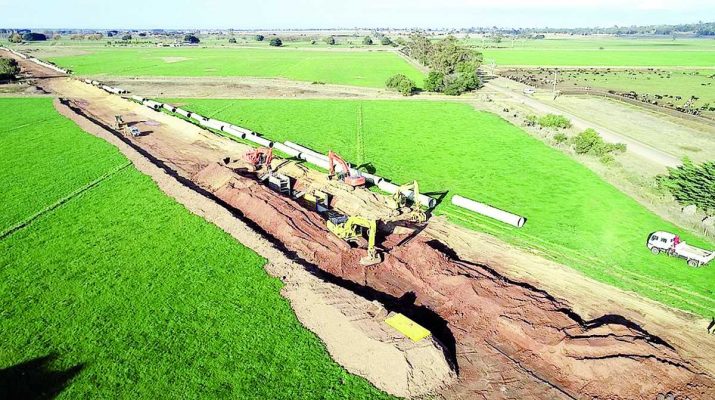Work on Phase 2 of the Macalister Irrigation District modernisation project is expected to begin this winter, after the state government recently announced $10.4 million for the project.
On May 19, Water Minister Lisa Neville announced $48.4 million in water projects throughout Victoria to modernise irrigation, secure water supplies through recycling and stormwater use, assist with bushfire recovery and benefit the environment.
The MID Phase 2 funding is part of the government’s new $2.7 billion Building Works package.
Ms Neville said the government funding for the MID modernisation project would ensure the four-year project would be completed.
The project will reconfigure the Newry irrigation supply, with pipeline replacing channels and automation of outlets, and there will be upgrades and reconfiguration of the Nuntin and Stratford irrigation supply networks.
A large proportion of the funding will go towards channel and outlet reconfiguration upgrades.
The completed modernisation works are expected to save more than 12 gigalitres of water by reducing leakage, and improve the health of the Gippsland Lakes by reducing nutrient run-off.
The federal government will contribute $31 million towards the $62.7 million project, with the remainder from Southern Rural Water’s MID customers.
Newry dairy farmer Steve Dwyer was philosophical about the large financial impost the upgrades are inflicting on farms, saying the benefits of modernisation outweigh the negatives “but only just”.
“There is a cost to farmers which was originally meant to be one third, we understand that, but there are other negatives such as the problems for the Newry Creek, which is basically a wetland that is likely to dry up,” he said.
“Farmers that now get their water from that creek will end up having to buy water.”
But Mr Dwyer said there were massive infrastructure problems in the Newry area that had to be fixed.
“We have to keep up with technology or we’ll be left behind,” he said.
State Nationals MPs say Gippsland has been “dudded” over the irrigation funds.
Member for Gippsland East Tim Bull said the state government had shirked its responsibilities and broken a long-standing cost-sharing agreement with irrigators and the federal government.
Irrigation modernisation programs, including all previous stages of the MID 2030 program, have historically been shared three ways between the two levels of government and irrigators themselves, but Mr Bull said the government had now “broken that deal”.
“The Commonwealth, through Darren Chester, has put up half the cost of the project and the state Labor government has taken advantage and cheated on what should have been it’s share of $20 million.”
Member for Gippsland South Danny O’Brien said the government could have supported farmers in the MID, who were just beginning to recover from drought and the milk crisis.
“Here was a chance for Daniel Andrews and Water Minister Lisa Neville to support our farmers and reduce the contribution irrigators have to make to this project, but they’ve taken the easy route again.
“They’ve short-changed farmers to help prop up their own bottom line. This is a good project that will boost productivity and help create jobs in Gippsland, and Labor’s contribution is too little too late.”
Shadow water minister Steph Ryan said the government’s contribution stood in stark contrast to the money it was spending in Melbourne.
“This $10 million contribution is a fraction of the cost over-runs on one of Labor’s Melbourne projects,” she said.
Southern Rural Water, the corporation responsible for managing irrigation districts, has welcomed the funding.
The latest funding takes the total to $154.7 million for the MID modernisation program since 2013.
Early stage work will begin alongside the final Riverslea stage of the Phase 1B project which is transforming the southern Tinamba supply network.
The MID contributes up to $500 million to Victoria’s economy each year.

